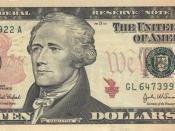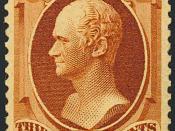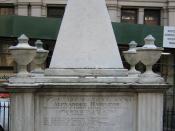Hamilton and the National Debt In the early 1790's, the new nation was confused as to what to do about the national debt. Alexander Hamilton, the secretary of the treasury, proposed a plan to help pay off the balance. Part of his plan was not to pay the public debt back, but only to pay the people interest earned over the years. For example, a person might only receive â¤200 instead of the â¤1000 he rightly deserves for selling his certificates, but the person ends up paying taxes to raise the â¤200 back up to â¤1000. Some people supported the plan, believing it would work, while others, who thought it gave away money to those least deserving of it, opposed it.
People who opposed Hamilton's debt plan tended to be the more common folk - farmers from the south. They believed that the plan was a flagrant act of injustice that only benefited speculators and brokers.
In their opinion, public credit existed only at the expense of public justice. However, the opposition was very angry, and believed that the people the plan hurt the most were the soldiers of the Revolutionary War. Congress was paying money to men who didn't even deserve it: speculators. Opposers disagreed Hamilton's declaration that people sold their certificates by choice and not by necessity. They believed that they were compelled to sell their certificates because of hard times. The cash, they feared, would begin to center around major cities and afterwards in England and Holland, causing further depreciation of the United States currency. The plan would also make it impossible for farmers to borrow money to fix their lands. Another possible effect one man argued was that 'It will fill our country with brokers and idle speculators." Farmers everywhere believed their nation's leaders had deceived them, and that they would have been better off if they had still been under British rule. Although they didn't support the plan, they suggested ways to fix it, such as paying the sellers and buyers of certificates the same amounts of money.
Defenders of Hamilton's plan didn't make much of an argument, but they felt that the plan was justified. Most didn't even think it was a very big deal. The holders of the certificates had to abide by value changes - property constantly depreciated over the years. Many defenders believed people were trying to take advantage of the situation and raising an unnecessary outcry against the plan. Speculators had purchased the certificates fairly at their market price, and at a considerable risk. They had done a favor and showed compassion toward the original holders by buying the certificates when no one else wanted them.
Even though the supporters and opposers of Hamilton's debt plan were opposite in their views, there a few similarities between them. Both sides stated that the values of the certificates decreased. They also agreed that depreciation certificates hurt the public. They realized the north and south had their own views and that the areas had different priorities concerning the plan. They were fully aware that northerners tended to support the plan while southerners opposed it.
The people who opposed Hamilton's plan as well as the people who supported it felt justified in their arguments. The nation was at a division on this issue, and neither side gave in easily. The plan had benefits, but it also had its downside. What one side might find beneficial to the people another might think it unconstitutional. Any situations regarding national problems and the public are difficult to solve, especially when people look at things in different ways and make their own interpretations - it is difficult to please everyone.





